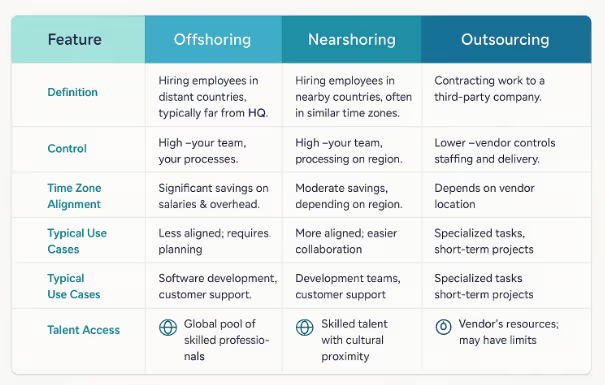The Benefits, Advantages, and Downside of Offshoring: A Complete Guide

Offshoring is a strategic approach that businesses employ to maximize their potential while managing the dynamic global framework. It refers to relocating business operations, processes, or functions from one country to another, typically to a lower-cost location. The primary driving force behind offshoring is the pursuit of cost savings and enhanced efficiency. Businesses choose this strategy to optimize their resources and remain competitive in a demanding marketplace.
Offshoring isn’t just about cutting costs—it’s a proven strategy to access skilled global talent, ensure 24/7 operations, and scale quickly without the overhead of local hiring. Yet many businesses hesitate, worried about quality control, time zone challenges, or managing remote teams.
This guide will clarify the benefits of hiring offshore talent, address common concerns, and help you decide if offshoring is the right move. We’ll cover practical advantages like cost savings and flexibility, plus real-world examples from the Philippines, Latin America, and South Africa.
What Does “Offshoring” Mean?
Offshoring means hiring talent in another country to perform business functions typically done in-house or locally. Unlike outsourcing, which often involves hiring third-party providers, offshoring usually means building your own dedicated remote team.
It also differs from nearshoring, which places teams in nearby countries for time zone alignment. With offshore outsourcing, businesses can tap into highly skilled talent at a fraction of local costs while maintaining direct control over training, quality, and culture—making it a powerful alternative to traditional local hiring.
Choosing the right global hiring strategy depends on your goals and operational needs. Offshoring, nearshoring, and outsourcing each offer distinct advantages and challenges. The table below outlines the key differences to help you determine which approach best aligns with your business strategy, whether you're seeking cost savings, greater control, or better time zone alignment.
Key Benefits of Hiring Offshore Talent

Offshore teams help businesses scale efficiently, diversify their workforce, and focus on core priorities while maintaining high-quality output. Learn how offshore hiring can drive growth and benefit your business to stay competitive.
Cost Savings
One of the most compelling benefits of hiring offshore talent is the substantial reduction in labor costs and overhead.
Lower Labor Costs
Offshore hiring offers significant cost advantages across key talent markets. The table below compares typical salaries for software developers and customer support agents in leading offshore destinations as a percentage of U.S. pay, illustrating the substantial savings businesses can achieve while accessing skilled, English-speaking talent.
All figures are the latest available (2024–2025) and shown in USD for easy comparison. The significant gaps illustrate the cost savings potential—offshore salaries in these regions are a fraction of U.S. equivalents, offering 50–80% (or more) in labor cost reductions for mid-level roles.
Reduced Overhead
Beyond salaries, offshoring cuts costs for office space, utilities, equipment, and HR management. This approach turns large fixed expenses into flexible, scalable investments—freeing up budget to reinvest in growth, innovation, and customer experience.
Access to Skilled Talent
Another major advantage of offshoring is access to a global talent pool with specialized skills often hard to source locally.
Global Talent Pool
Offshore hiring connects businesses to experienced professionals across fields like software development, web developer, finance, and customer support—helping fill talent gaps and avoid local shortages.
Hard-to-Find Skills
Markets in Latin America, for example, have become known for producing highly skilled software developers at competitive rates. In Mexico, mid-level software engineers average $40,000–$54,000 USD/year, a fraction of U.S. pay but with strong English fluency and overlapping time zones for U.S. teams
Offshoring makes it practical to build high-quality teams with specialized capabilities without the limitations of local hiring markets.
24/7 Coverage
Among the most strategic benefits of offshoring is the ability to provide seamless 24/7 coverage for customers and operations.
Follow-the-Sun Model
By hiring teams in different time zones, companies can deliver round-the-clock service without requiring overnight shifts for local staff.
Customer Support Around the Clock
For instance, South Africa’s time zone aligns well with Europe, making it a prime location for businesses seeking real-time customer support during European business hours (SalaryExplorer). South Africa also offers a large, English-speaking workforce experienced in customer service, making it a cost-effective and strategically located option for international coverage.
Flexibility & Scalability
A key benefit of offshore outsourcing is the ability to scale teams quickly in response to changing business needs.
Easy to Ramp Up or Down
Offshoring allows companies to add or reduce headcount without the challenges of local recruiting, onboarding, and office expansion. This flexibility is ideal for seasonal demands, project-based work, or rapid growth plans.
Downsides of Offshoring
Many companies scale customer support teams quickly offshore to handle busy seasons or marketing campaigns without committing to long-term local overhead. By partnering with offshore providers or building dedicated remote teams, businesses can maintain high service
While offshoring offers clear cost and talent advantages, it’s important to plan for potential challenges. Below are some common downsides of offshoring that businesses should consider carefully, along with practical strategies to mitigate these risks and ensure successful collaboration.
Time Zone Coordination
Working across time zones can create communication challenges. Teams may need to adjust meeting schedules or adopt asynchronous workflows to maintain productivity. Mitigating this involves clear communication plans, overlapping hours where possible, and using collaboration tools effectively.
Cultural Alignment
Differences in work culture and communication styles can impact team dynamics. Investing in cultural training, setting clear expectations, and fostering an inclusive environment help build mutual understanding and trust.
Quality Control Risks (and How to Mitigate Them)
Ensuring consistent quality across remote teams can be challenging. The solution is implementing clear processes, robust training, and regular performance reviews. Partnering with experienced offshore providers who specialize in vetting talent also reduces this risk significantly.
Data Security Concerns (and Solutions)
Offshoring can introduce data security concerns if sensitive information is shared across borders. To mitigate this, companies should enforce strict security protocols, use secure communication channels, and ensure compliance with relevant data protection laws.
Is Offshore Outsourcing Right for You?
Deciding whether offshore outsourcing is the right strategy for your business involves understanding what it entails and when it provides the most value. Offshore outsourcing means contracting out certain business functions to external providers in other countries, leveraging cost advantages and global talent.
Below, we break down when to choose offshoring versus outsourcing, highlight the benefits of offshore outsourcing, and look at real-world examples of companies that succeeded with these strategies.
When to Offshore vs. Outsource
Both offshoring and outsourcing can improve efficiency, but they differ in approach. Offshoring means relocating some operations to another country to gain benefits like lower costs or taxes. This can be done within your own company (e.g. opening an overseas office or factory) or through an external partner. Outsourcing, on the other hand, means hiring a third-party vendor to handle certain tasks or services, which could be domestically or abroad. (When you combine the two by hiring a foreign third-party, you are essentially offshore outsourcing.) Choosing between these options depends on your business needs:
- Offshore if you want to maintain direct control over an operation while taking advantage of another country’s cost or talent benefits. Offshoring is ideal for larger, long-term projects where you can manage an overseas team and need to tap into a global talent pool at lower labor cost. For example, a company facing a local tech talent shortage or high domestic wages might set up an overseas development center to access skilled engineers and reduce expenses. This approach makes sense if you have the resources to oversee the offshore team and seek substantial cost savings over time.
- Outsource if you lack specific in-house expertise or have a short-term, well-defined task to delegate. Outsourcing to a specialist firm is preferable when you need fast access to skills your team doesn’t have or when the project is not core enough to justify hiring full-time staff. This strategy offers flexibility—you can scale the service up or down as needed without long-term commitments. In practice, companies often outsource functions like customer support, accounting, or IT support when they want expert service and the ability to focus their internal team on core business activities.
Offshoring works best for long-term expansions that capitalize on overseas advantages (and where you’re prepared to manage remote operations), whereas outsourcing suits targeted functions or projects where external expertise and quick scalability are key.

Why the Philippines, Latin America & South Africa Are Top Offshore Destinations
When selecting an offshore destination, it’s essential to understand what makes each region effective for global hiring. These three locations stand out for their cost efficiency, skilled talent, and operational advantages, making them top choices for companies worldwide.
Philippines
The Philippines is one of the world’s most established offshore hubs, with a workforce known for exceptional English fluency and a strong customer service orientation. The country’s long history in Business Process Outsourcing (BPO) means employees are well-trained in Western business practices and customer expectations.
In addition to customer support, the Philippines is a top destination for back-office services, virtual assistance, finance and accounting, and administrative roles. The cultural alignment, professional work ethic, and government support for the BPO industry make it a reliable, low-risk option for companies seeking to scale service teams quickly and affordably.
Latin America
Latin America offers a unique advantage for North American businesses: similar time zones, making collaboration, real-time meetings, and project management much easier. This proximity supports seamless communication without the need for overnight shifts or major scheduling adjustments.
The region is also gaining global recognition for its highly skilled tech talent. Countries like Mexico, Colombia, and Argentina boast strong developer communities with solid English proficiency and competitive rates. Businesses routinely offshore software development, quality assurance, design, and digital marketing roles to Latin America to access expertise that’s often scarce or costly in the U.S.
South Africa
South Africa is a premier choice for companies targeting European markets thanks to its time zone alignment with Europe, strong English language skills, and cultural compatibility with UK and European business practices.
The country has a large, experienced workforce in customer service, sales, and back-office functions. South Africa’s government actively supports the BPO industry, with robust training programs to ensure quality. It’s a fantastic option for businesses seeking cost-effective support teams that deliver a customer experience on par with local European standards.
Maximize the Advantages of Offshoring With the Right Partner
Offshoring offers undeniable benefits—from cost savings and access to skilled global talent to 24/7 coverage and the flexibility to scale on demand. But success isn’t just about finding cheaper labor. It’s about building the right team in the right location, with the right processes and support in place.
Choosing the right partner is crucial in this process. At Hire Overseas, we help businesses navigate the complexities of offshore hiring with confidence. From vetting qualified candidates in markets like the Philippines, Latin America, and South Africa to ensuring cultural alignment and compliance, our team delivers a seamless, tailored approach that meets your goals.
Ready to tap into offshore talent?
Book a discovery call with our team to discuss your hiring needs:
Browse Categories
Unlock Global Talent with Ease
Hire Overseas streamlines your hiring process from start to finish, connecting you with top global talent.








